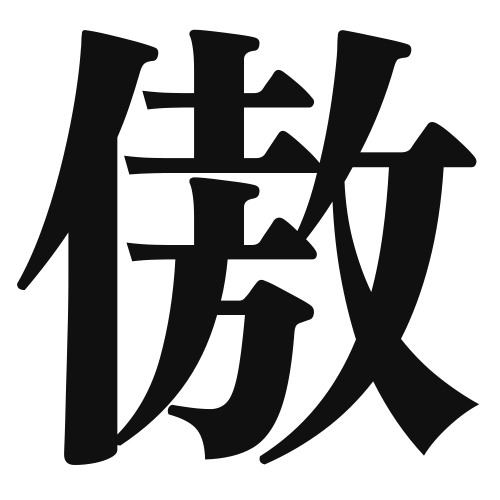1. Overview of Meaning
The kanji “傲” (pronounced “ou” in Japanese) means “arrogance” or “pride.” It conveys a sense of haughtiness or an inflated sense of self-importance.
2. Formation and Radical
The kanji “傲” is a compound character (会意文字) that combines two elements: the radical “亻” (which indicates a person) and “吾” (which means “I” or “myself”). This combination suggests a person who is overly focused on themselves, leading to arrogance.
The radical of “傲” is “亻,” which is a variant of “人” (meaning “person”). This radical is commonly found in kanji related to human actions or characteristics.
3. Examples of Usage
Common words and phrases that include “傲” are:
- 傲慢 (おうまん, ouman) – arrogance
- 傲慢無礼 (おうまんぶれい, oumanburei) – rude arrogance
Example sentence in daily conversation:
彼は傲慢な態度を取っている。
(かれはおうまんなたいどをとっている。)
(He is displaying an arrogant attitude.)
4. Synonyms and Antonyms
Similar kanji with related meanings include:
- 自尊 (じそん, jison) – self-respect (which has a positive connotation)
- 誇り (ほこり, hokori) – pride (which can be positive or negative depending on context)
Antonyms include:
- 謙虚 (けんきょ, kenkyo) – humility
- 従順 (じゅうじゅん, juujun) – obedience
5. Cultural and Historical Background
The concept of “傲” is significant in Japanese culture, where humility and modesty are highly valued. Arrogance is often viewed negatively, and people are encouraged to practice humility.
Proverbs and idioms related to “傲” include:
- 「傲慢は破滅を招く」 (おうまんははめつをまねく) – “Arrogance invites ruin.”
This reflects the cultural belief that pride can lead to one’s downfall.
